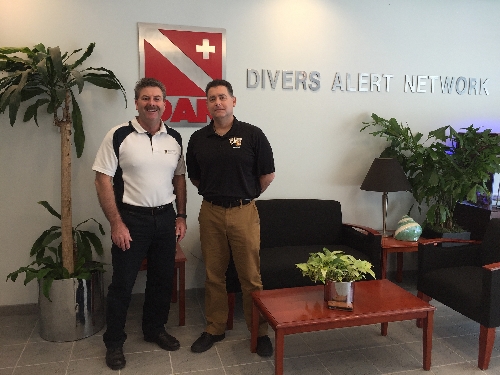University News
Divers Alert Network Injury & Prevention Director to Speak at WIU April 19
April 5, 2017
MACOMB, IL -- Peter Buzzacott, the director of injury monitoring and prevention for the Divers Alert Network (DAN) in North Carolina, will present "Non-Fatal Close Calls and Lessons Learned from Scuba Diving Incidents" at 6:30 p.m. Wednesday, April 19 in Brophy Hall 224 at Western Illinois University.
Buzzacott, a former recreational and technical diving instructor with over 500 issued certifications, has had 50 scientific papers and four book chapters published, as well as nearly 200 feature articles in dive magazines. He is certified as an advanced trimix cave diver and is a regular speaker at dive shows and conferences, including at DEMA, Our World Underwater and Boston Sea Rovers.
Buzzacott's presentation is open free to the public.
DAN was formed at Duke University in 1980, starting as a hotline for divers, explained WIU Kinesiology Professor and Scuba Instructor Christopher Kovacs. Today, DAN is the clearinghouse for dive research, medicine and safety. Kovacs and Buzzacott have been collaborating on research for the past 18 months and recently had a paper, "Self-reported Exercise Behavior and Perception of its Importance to Recreational Divers," accepted for publication in the International Maritime Health journal. Kovacs noted that Buzzacott and Divers Alert Network have been essential to his research and career.
"When I had the chance to visit the DAN headquarters during my sabbatical in Fall 2015, I saw firsthand the research being conducted to improve dive safety and how people were calling in from all over the world to utilize their free injury prevention and management hotline. That was neat to see from the perspective of those nurses and emergency medical technicians answering the hotline calls," Kovacs said. "In several instances, I've been on the other end of that scenario, the diver thinking about making or the one making the call to DAN. Establishing both a collaborative relationship and friendship has been a highlight of my academic career."
The WIU Department of Kinesiology scuba diving minor is one of only a very few academic scuba diving minors available in the United States. Founded in 2008 by Dan Walter, kinesiology instructor and scuba program coordinator, the minor program at WIU offers a unique program of study that gives students real-world diving skills—and has been doing so for nearly half a century. While the minor became an official minor area of study in 2008, scuba diving has been taught by kinesiology faculty for more than 48 years.
"Today, Western's diving minor requires students to complete an extensive academic program, including 16 credit hours of coursework divided among four separate classes: KIN 108, 208, 308 and 408, which are all specific to dive training. It produces skilled divers because of the amount of time the students spend with Dan, learning about the skills they need," Kovacs added.
Another reason students may minor in scuba may have to do with how they plan to use diving skills in their future careers, such as a student studying law enforcement and justice administration who may need to dive in the line of duty someday.
"Minoring in this program at Western has helped our students get jobs. There at least 27 students I know of who were qualified for positions -- either jobs or internships -- they applied for, and were offered and taken, because of their scuba diving skills," Walter explained.
Students may also be attracted to the scuba diving minor because of Walter's dedication to the program and commitment to creating diving opportunities for them. He not only teaches in the program, but he also organizes diving trips for students to a training quarry north of Macomb, as well as to diving locations in the U.S. and in the Caribbean (including a trip to the Bahamas during Spring Break 2016).
For more information about WIU's scuba diving program, see wiu.edu/coehs/kinesiology/scuba/.
Posted By: University Communications (U-Communications@wiu.edu)
Office of University Communications & Marketing


Connect with us: